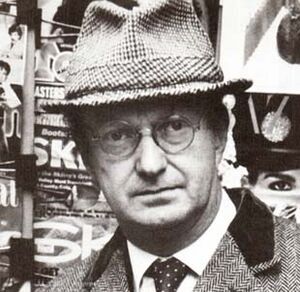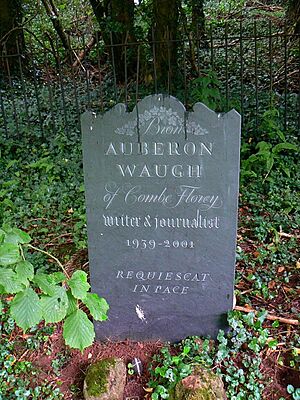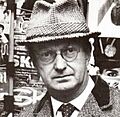Auberon Waugh facts for kids
Quick facts for kids
Auberon Waugh
|
|
|---|---|
 |
|
| Born | Auberon Alexander Waugh 17 November 1939 Dulverton, Somerset, England |
| Died | 17 January 2001 (aged 61) Combe Florey, Somerset, England |
| Occupation | Journalist, novelist |
| Education | Downside School |
| Alma mater | Christ Church, Oxford |
| Period | 1960–2000 |
| Genre | Novel, journalism |
| Spouse |
Lady Teresa Onslow
(m. 1961) |
| Children | 4, including Alexander and Daisy Waugh |
| Parents | Evelyn Waugh Laura Herbert |
| Relatives | Arthur Waugh (paternal grandfather) Aubrey Herbert (maternal grandfather) Alec Waugh (paternal uncle) |
Auberon Alexander Waugh (born November 17, 1939 – died January 16, 2001) was an English journalist and writer. He was the oldest son of the famous novelist Evelyn Waugh. Many people knew him by his nickname, "Bron."
Auberon Waugh went to Downside School and then served in the army for a short time. During his army service, he was seriously hurt in a shooting accident. After that, he studied at Oxford University for a year.
When he was 20, he started his career in journalism. He wrote for many newspapers and magazines, including The Daily Telegraph and Private Eye. He was known for having a unique style that was both traditional and rebellious. As a young man, Waugh wrote five popular novels. However, he later stopped writing fiction because he worried his books would always be compared to his father's.
He and his wife, Lady Teresa, had four children. They lived in a place called Combe Florey House in Somerset, England.
Contents
Early Life and Family
Auberon Waugh was born in Somerset, England, at his mother's family home. He was the oldest son of the well-known writer Evelyn Waugh. His grandfather, Arthur Waugh, was also a writer and publisher, and his uncle, Alec Waugh, was a writer too. His mother, Laura Herbert, came from a family with interesting connections. Her half-uncle was George Herbert, 5th Earl of Carnarvon, a famous Egyptologist who helped discover King Tutankhamen's tomb.
Auberon was named after his mother's brother, Auberon Herbert. His family and friends often called him "Bron."
He was born just as World War II began, so he didn't see much of his father until he was five years old. His parents were Roman Catholics, and he went to Downside School, a Benedictine school in Somerset. He passed his Greek and Latin exams when he was only 15. Later, he started studying at Christ Church, Oxford, but he left the university early to begin his journalism career.
A Difficult Accident
During his time in the army, called National Service, Auberon Waugh was a soldier in the Royal Horse Guards. He was serving in Cyprus when he had a very serious accident with a machine gun. He was trying to fix a problem with the gun on his armored car when it accidentally fired. Several bullets went through his chest.
Because of his injuries, he lost his spleen, one lung, several ribs, and a finger. He suffered from pain and infections for the rest of his life. While recovering from this accident in Italy, he started writing his first novel, The Foxglove Saga.
Journalism Career
Auberon Waugh started working as a journalist in 1960. His first job was as a young reporter for The Daily Telegraph, writing for their social column called Peterborough.
He also wrote for The Spectator, where he became a political columnist. During this time, there was a conflict in Biafra, a region that tried to separate from Nigeria. Waugh strongly criticized the British government for not doing enough to help the people suffering in Biafra. He was later fired from The Spectator, but he won a lawsuit for unfair dismissal.
Waugh was also critical of changes made in the Catholic Church after the Second Vatican Council. He often disagreed with the leaders of the Church at that time.
He wrote for many other publications, including the New Statesman, Daily Mirror, Daily Mail, and The Independent. From 1981 to 1990, he wrote a popular column for The Sunday Telegraph. In 1990, he returned to The Daily Telegraph to write the well-known Way of the World column until 2000. He also wrote weekly for The Sunday Telegraph until shortly before he passed away.
Private Eye
Waugh became very well known for his diary column in the magazine Private Eye. This column ran from the early 1970s until 1985. He famously described it as "specifically dedicated to telling lies," meaning it was often satirical and exaggerated. He fit in well with the magazine's style, even though he strongly disliked the Labour government of the 1970s.
He particularly disliked the education secretary, Shirley Williams, because she supported comprehensive education. In his autobiography, Waugh joked that he broke two bottles of wine celebrating when she lost her seat in Parliament in 1979.
Waugh himself ran as a candidate in the 1979 election. He did this partly to oppose Jeremy Thorpe, the former leader of the Liberals, who he also disliked. Waugh only received 79 votes, but Thorpe lost his seat in that election.
Waugh left Private Eye in 1986 when a new editor took over.
Auberon Waugh's Views
Auberon Waugh was known for his traditional, conservative views. He often disagreed with "do-gooders" and people who pushed for social change. Some people called him a nostalgist, meaning he liked old ways, and a romantic. He was also seen as a bit of a snob. However, he also had a rebellious side that made many people, even those with more modern views, admire him.
He broadly supported Prime Minister Margaret Thatcher at first. But by 1983, he became unhappy with her government's economic policies. He also became a strong opponent of Thatcher when she disagreed with his friend and editor, Peregrine Worsthorne.
Waugh had a house in France and was a strong supporter of European integration and the single currency. He believed this would help make the UK less influenced by America. He also had some unusual views, like being against the death penalty and often criticizing the police. He opposed laws against smoking and was against banning fox hunting in his later years.
He also had some unique ideas about health. He claimed that the dangers of smoking and drinking were exaggerated, but that eating hamburgers was very dangerous! He even joked about "hamburger gases" causing pollution and "passive hamburger eating." He also claimed that computer games could cause cancer.
Family Life
In 1961, Auberon Waugh married Lady Teresa Onslow. They had four children:
- Margaret Sophia Laura (born 1962)
- Alexander Evelyn Michael (born 1963)
- Daisy Louisa Dominica (born 1967)
- Nathaniel Thomas Biafra (born 1968)
They lived in Wiltshire for several years before moving into Auberon's father's old home, Combe Florey House in Somerset.
Literary Works
Auberon Waugh wrote five novels before he stopped writing fiction. He partly stopped because he felt authors didn't get enough money from books borrowed from libraries. He also felt he would always be compared to his famous father, which he found difficult. His novels are:
- The Foxglove Saga (1960)
- Path of Dalliance (1963)
- Who Are The Violets Now? (1965)
- Consider the Lilies (1968)
- A Bed of Flowers (1972)
He also wrote a book about the Jeremy Thorpe case called The Last Word. He co-wrote a book about Biafra called Biafra: Britain's Shame. In the 1970s, he made several television programs for ATV.
In 1986, his critical book Another Voice – An Alternative Anatomy of Britain was published and was well received. From that year until his death, he also edited the Literary Review magazine. There, he created awards for what he called "real" poetry, meaning poetry that rhymed and had a clear rhythm.
Two collections of his Private Eye diary entries were published: Four Crowded Years: The Diaries of Auberon Waugh 1972–1976 and A Turbulent Decade: The Diaries of Auberon Waugh 1976–1985.
In 1991, he was interviewed for a documentary about his family called Waugh Memorial.
Death

Auberon Waugh's health became much worse in the last few months of his life. He passed away from heart failure at his home, Combe Florey House, on January 16, 2001. He was 61 years old. He is buried in the graveyard of the Church of St Peter & St Paul, Combe Florey.
See Also
Images for kids
 | Audre Lorde |
 | John Berry Meachum |
 | Ferdinand Lee Barnett |



